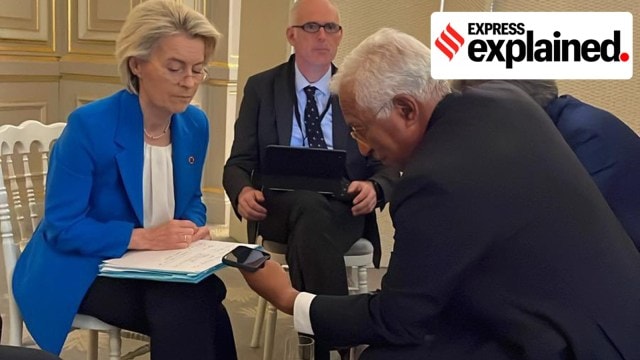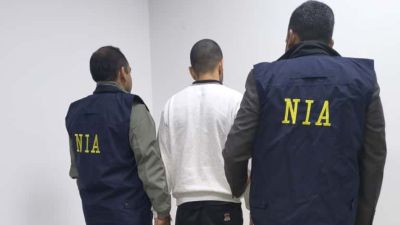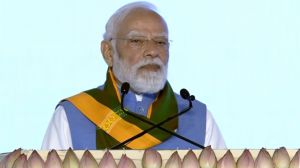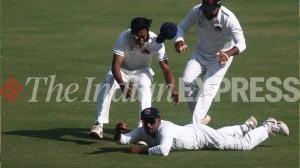Shubhajit Roy, Diplomatic Editor at The Indian Express, has been a journalist for more than 25 years now. Roy joined The Indian Express in October 2003 and has been reporting on foreign affairs for more than 17 years now. Based in Delhi, he has also led the National government and political bureau at The Indian Express in Delhi — a team of reporters who cover the national government and politics for the newspaper. He has got the Ramnath Goenka Journalism award for Excellence in Journalism ‘2016. He got this award for his coverage of the Holey Bakery attack in Dhaka and its aftermath. He also got the IIMCAA Award for the Journalist of the Year, 2022, (Jury’s special mention) for his coverage of the fall of Kabul in August 2021 — he was one of the few Indian journalists in Kabul and the only mainstream newspaper to have covered the Taliban’s capture of power in mid-August, 2021. ... Read More
10 meetings, 5 months: What to look out for in run-up to India-EU trade deal, summit
The dates for the India-EU leaders’ summit are yet to be decided, and can take place in January or February, 2026, depending on the negotiations for the trade deal.
 European Commission President Ursula von der Leyen and European Council President Antonio Costa during their call with Prime Minister Narendra Modi Thursday. (Image source: X@eucopresident)
European Commission President Ursula von der Leyen and European Council President Antonio Costa during their call with Prime Minister Narendra Modi Thursday. (Image source: X@eucopresident)Amid the strain in ties between Delhi and Washington over the 50 per cent tariffs imposed by the Trump administration, India and the EU are embarking on an “intensive” roadmap over the next five months — with 10 meetings in the next 5-6 months, leading to the India-EU leaders’ summit early next year — that will signal strategic stability in bilateral ties.
The dates for the India-EU leaders’ summit are yet to be decided, and can take place in January or February, 2026, depending on the negotiations for the trade deal. If all goes to plan, there is a possibility of Delhi inviting EU leaders as chief guests for the Republic Day celebrations.
On September 17, the EU Commission will unveil a strategic agenda roadmap document on what it has to “offer” to India. It will be a political and policy document, which will be circulated among 27 member countries of the EU.
This ambitious agenda will cut across political, security, defence, trade and tech sectors. On September 4, Prime Minister Narendra Modi and President of the European Commission Ursula von der Leyen and President of the European Council Antonio Costa spoke on phone and discussed “early conclusion of the India-EU FTA and implementation of the IMEEC corridor” and efforts for “an early end to the conflict in Ukraine”.
Starting from this week, there will be 10 meetings over the next 5 months. They will build on the visit of the College of Commissioners of the EU — equivalent to the Council of Ministers in India — in February this year, which was led by von der Leyen.
* EU’s Commissioner for Trade Maros Sefcovic and Commissioner for Agriculture Christophe Hansen will be in Delhi this week to lead the India-EU FTA negotiations. Equivalent to Cabinet ministers, they are going to lead a 30-member team from Brussels and will meet their counterparts in Delhi.
* Around the same time, the Political and Security Committee (PSC) of the EU – it is a standing committee of the European Council at the ambassadors’ level – will be in Delhi, which would mean that there will be 27 ambassadors of member countries of EU, and the chair of PSC. So, this will also be a 30-member delegation.
* Again this week, in Brussels, there will be a thematic dialogue on “counter-terrorism” which will be led by Joint Secretary rank officers from both sides.
* Early October, the next round of FTA negotiations will take place in Brussels, most likely on October 8.
* The standing committee of the European Parliament on trade matters will visit India at the end of October. It will comprise 7-8 members.
* The trade and technology ministerial meeting is also scheduled in the fall in Brussels. The dates are yet to be confirmed.
* The Indo-Pacific Forum will be held in Brussels on November 20-21, which is expected to be attended by External Affairs Minister S Jaishankar.
* The Foreign and Security policy group meeting is expected to be held in the last week of November, which is to be attended by Secretary (West) in the MEA and his EU counterpart, in Brussels.
* The Strategic Partnership review meeting, which is an overarching stock-taking meeting, will be held in Delhi in November/December.
* The High Representative and Vice President of the European Union, Kaja Kallas, is expected to visit India in December 2025 or January 2026, depending on the FTA negotiations and the India-EU leaders’ summit.
This will be capped by the India-EU leaders’ summit in New Delhi, and this could happen in January or February next year.
While the US administration’s actions have injected a sense of urgency, EU sources said that “they are not determined by others” and are determined by recognising the value of each other.
Recalling Modi’s phone call with von der Leyen and Costa last week, the EU source said that the “call went very well”, and “it was not just on the substance” but also “the level of trust between the leaders”. The source said the warmth was “noticeable” and discussions were on “bilateral relations” and “global issues”, including China, Russia, US, Ukraine.
This call took place after the meeting of the Coalition of the Willing in Paris, and the two sides exchanged perspectives. “This is how this relation has grown in maturity, in momentum, in trust and respect. I think what has really injected this notion of trust is because we are predictable… but also respect, we are not imposing. We are not in the game of extracting,” the source said, hinting at the Trump administration’s tariff policies.
The EU, the sources said, is not in the zero-sum game, but in the “positive sum game”. So, this series of meetings, the source said, is the “gameplan for the next six months.”
“And they will interact on trade, investment, technology including semiconductors, AI, biotech and pharmaceuticals. They will also discuss security and defence, where I think there is a lot of appetite, because of our respective needs, in beefing up our respective capabilities, but also in terms of procurement… also, on mobility, and I will say in a global environment when migration tends to be painted really negatively, including in Europe, India will probably want to be where we have a positive agenda on mobility because it fits our respective needs and economic necessity, about mobility of workers…. and the last one is about working together as global partners,” the source said, adding that these “really define the intersection of our interests underpinned by shared values and this sense of, we can work together.


- 01
- 02
- 03
- 04
- 05





































